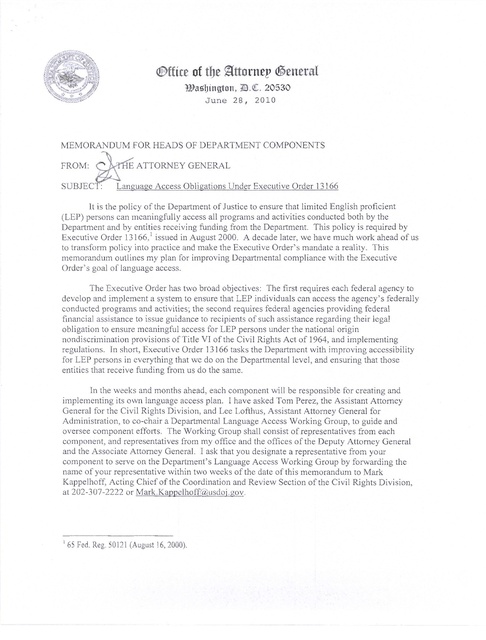Memo re Language Access Obligations Under EO 13166, OAG, 2010
Download original document:

Document text

Document text
This text is machine-read, and may contain errors. Check the original document to verify accuracy.
®fftte of tbe ~ttornep ~eneraI Wa%btngton, 1J.B. <t. 20530 June 28, 2010 MEMORANDUM FOR HEADS OF DEPARTMENT COMPONENTS FROM: C~ ATTORNEY GENERAL SUBJEC~angUage Access Obligations Under Executive Order 13166 It is the policy of the Department of Justice to ensure that limited English proficient CLEP) persons can meaningfully access all programs and activities conducted both by the Department and by entities receiving funding from the Department. This policy is required by Executive Order 13166,1 issued in August 2000. A decade later, we have much work ahead of us to transform policy into practice and make the Executive Order's mandate a reality. This memorandum outlines my plan for improving Departmental compliance with the Executive Order ' s goal of language access. The Executive Order has two broad objectives: The first requires each federal agency to develop and implement a system to ensure that LEP individuals can access the agency's federally conducted programs and activities; the second requires federal agencies providing federal financial assistance to issue guidance to recipients of such assistance regarding their legal obligation to ensure meaningful access for LEP persons under the national origin nondiscrimination provisions of Title VI of the Civil Rights Act of 1964, and implementing regulations. In short, Executive Order 13166 tasks the Department with improving accessibility for LEP persons in everything that we do on the Departmental level, and ensuring that those entities that receive funding from us do the same. In the weeks and months ahead, each component will be responsible for creating and implementing its own language access plan. I have asked Tom Perez, the Assistant Attorney General for the Civil Rights Division, and Lee Lofthus, Assistant Attorney General for Administration, to co-chair a Departmental Language Access Working Group, to guide and oversee component efforts. The Working Group shall consist of representatives from each component, and representatives from my office and the offices of the Deputy Attorney General and the Associate Attorney General. I ask that you designate a representative from your component to serve on the Department's Language Access Working Group by forwarding the name of your representative within two weeks of the date of this memorandum to Mark Kappelhoff, Acting Chief of the Coordination and Review Section of the Civil Rights Division, at 202-307-2222 or Mark.Kappelhoff@usdoj.gov . I 65 Fed. Reg. 50121 (August J 6,2000). Memorandum from the Attorney General Subject: Language Access Obligations Under Executive Order 13166 Page 2 Representatives are responsib le for a number of important tasks, including : (1) serving as the component' s language access coordinator; (2) assessing component operations for LEP needs and gaps in service; and (3) creating a component language access plan, along with policies and protocols to implement the plan, in accordance with the standards set forth by the co-chairs of the Working Group. Representatives will submit component LEP plans for the Working Group's approval, on a schedule to be determined by the co-chairs. Once all plans are reviewed and approved and the larger Departmental LEP plan is assembled, the Working Group will oversee implementation of the plans. The Working Group' s ongoing responsibilities will involve periodically reassessing LEP needs and component compliance with LEP policies; reviewing and updating plans and policies ; and ensuring that staff LEP training and recipient enforcement efforts remain vigorous. As you commence the planning process and consider the extent to which your individual components interact with LEP people, keep in mind the myriad number of ways in which the Justice Department does business. Every day, Department staff interview witnesses, victims, and defendants in civil, criminal, and administrative cases and investigations; we communicate with inmates who seek to access prison grievance procedures, counseling, health services, religious and other accommodations, and educational programming; we hold immigration hearings, review immigration judges' determinations, generate correspondence related to these activities, and defend administrative immigration decisions in federal court; we maintain hotlines and establish complaint procedures for members of the public; we host web pages containing important information; we transport prisoners between facilities and to court; we are accountable for communications between trustees and debtors, ensure that debtors understand information on bankruptcy, and oversee the credit counseling and debtor education process; we conduct outreach and produce brochures related to crime victims' rights, trafficking in persons, police misconduct, predatory telemarketing, and a host of other impOliant issues. The list of potential interactions with LEP individuals is as long as our functions are broad, but all of these examples point to a singular reality : our mission depends on accurate communication with members of the public, regardless of their level of English proficiency. Please refer to the attached supplement for resources and further guidance on our language access efforts. Should you or your staff require further assistance or support in implementing the goals of this memorandum , please do not hesitate to contact Mark Kappelhoff, in the Civil Rights Division, at (202) 307-2222 . Thank you for your continued commitment to ensuring that LEP individuals have meaningful access to the work of the Department and its funding recipients.

